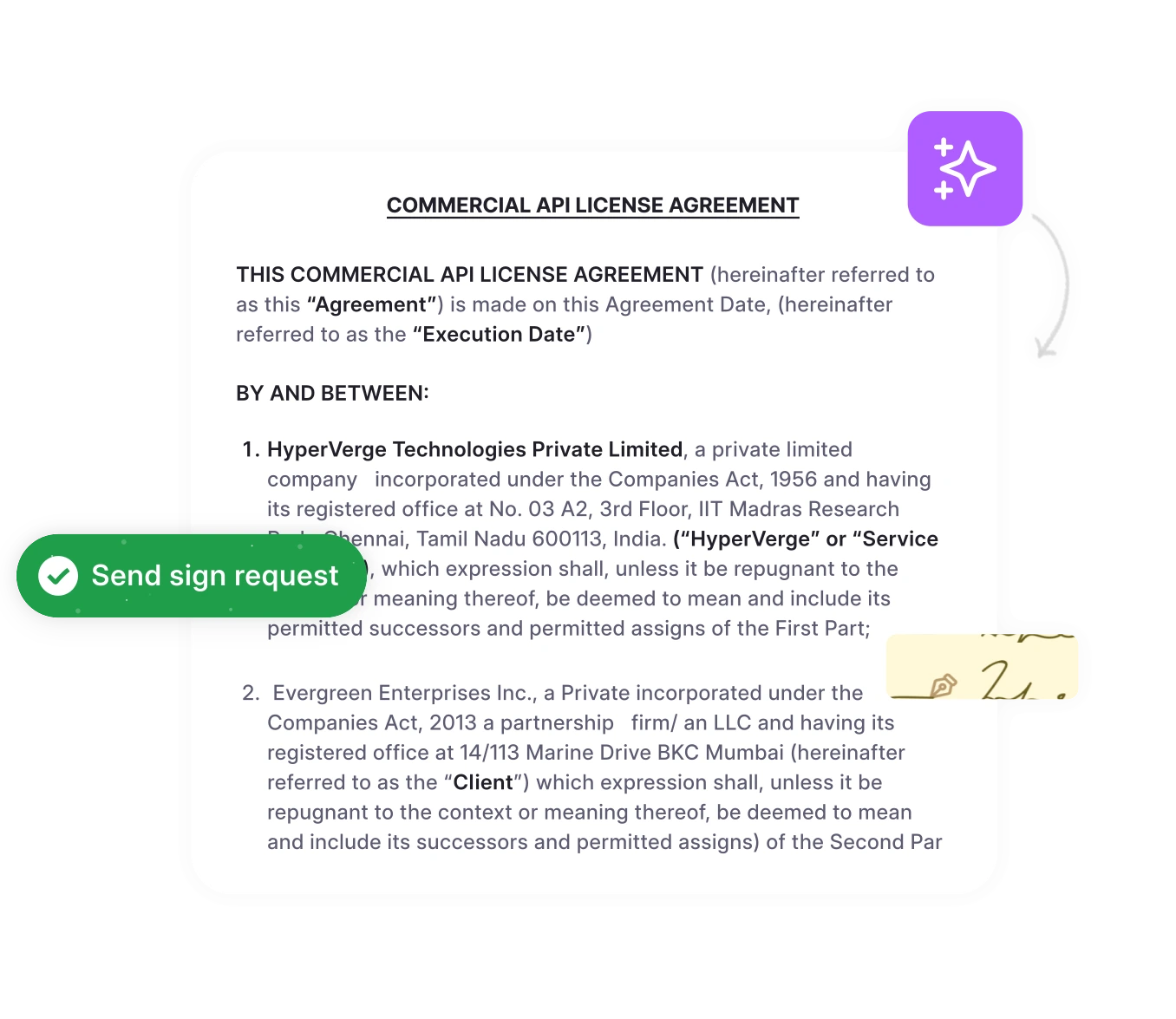If you work with the same clients or vendors on multiple projects, starting from scratch every time around is unsustainable. It’s slow, repetitive, and full of risks. The MSA Agreement provides the boilerplate language and legal framework that governs ongoing business relationships, establishes legal parameters for the parties involved, and mitigates potential risks and compliance issues.
Each party on the MSA serves specific organizational needs and scenarios. This guide uncovers the significance, benefits, clauses, and use cases. We’ll also learn how to draft, redline, sign, and manage them with CLMs.
Let’s begin.
What is a master service agreement?
A Master Service Agreement (MSA) is the main contract that governs the entire relationship between two or more parties.
Unlike project-specific contracts, an MSA establishes standard terms that apply across multiple engagements, eliminating the need to renegotiate core provisions for each new statement of work.
The MSA creates a predictable structure where both parties understand their fundamental obligations, rights, and limitations before any specific project begins. This approach reduces transaction costs and accelerates future project timelines.
How does an MSA agreement streamline service delivery
MSAs transform how organizations manage recurring vendor relationships. Instead of negotiating identical terms repeatedly, parties reference the established MSA framework and focus negotiations on project-specific elements within subordinate statements of work.
This streamlined approach proves particularly valuable for organizations like LeadSquared, where managing 180-250 contracts monthly requires efficient processes.
You get an MSA from a big client, which will go into some 20-30-40 pages. The usual time for the legal counsel to manually review it and revert would be between 4 and 6 hours.
Om Prakash Pandey
Head of Legal at LeadSquared
The significance of MSAs
Modern business relationships increasingly rely on ongoing partnerships rather than one-time transactions. MSAs acknowledge this reality by creating durable frameworks that accommodate evolving business needs while maintaining legal certainty.
Organizations face mounting pressure to accelerate contract cycles while managing compliance requirements. Research indicates that inefficient contracting causes delays in 70-80% of B2B sales cycles. Contract Management Institute Most Negotiated Terms Report 2024 Reveals $100 billion savings opportunity for US Federal Government, directly impacting revenue generation and market competitiveness.
The core benefits of implementing an MSA
1. Accelerating project timelines and SOW execution
MSAs eliminate manual reviews of basic terms to simplify future agreements by establishing pre-agreed terms for fundamental contract elements. When new projects arise, teams focus exclusively on project-specific deliverables, timelines, and pricing rather than relitigating liability limitations, intellectual property rights, or payment terms.
This acceleration proves critical in competitive markets where contract delays result in lost opportunities. Organizations implementing structured MSA programs report significant improvements in time-to-contract execution.
2. Establishing clear legal parameters to mitigate compliance risk
Contract disputes carry substantial financial consequences. 46% of small and medium enterprises (SMEs) have taken financial hits from unaddressed legal problems, with the average contract dispute costing over £72,000. MSAs mitigate these risks by establishing clear legal frameworks before disputes arise.
Well-structured MSAs define dispute resolution mechanisms, governing law, and compliance requirements upfront. This proactive approach reduces ambiguity that often leads to costly legal conflicts.
Read also: Contract Creation Simplified
3. Creating a predictable framework for commercial terms
MSAs provide commercial predictability by standardizing key business terms across multiple engagements. Payment schedules, invoicing procedures, and performance standards remain consistent, simplifying financial planning and operational execution.
This predictability extends to both parties, enabling more accurate resource allocation and project planning. Vendors gain certainty about payment terms and performance expectations, while buyers benefit from consistent service delivery standards.
Read also: Contract Automation Software: Process, Benefits & Use Cases
Close contracts 10x faster with AI
Modern businesses use HyperStart to automate contracts from start to finish. The AI-powered CLM that every team can use. Want to see how?
Book a DemoKey components of a good MSA agreement
A well-structured MSA contains several critical components that establish the foundation for successful long-term partnerships.
1. The scope of services
This section defines the general categories of work covered under the agreement, providing flexibility for future projects while maintaining clear boundaries.
2. Payment terms
The payment terms, schedules, and invoicing procedures establish the financial framework, including payment schedules, late payment penalties, and approved payment methods. These standardized terms eliminate payment-related negotiations for each subsequent project.
3. Intellectual property rights
The intellectual property rights clause clarifies ownership rights for work products, existing intellectual property, and derivative works. This clarity prevents disputes and ensures both parties understand their rights before work begins.
4. Indemnity, warranty, and liability clauses
The Big Three, liability limitations, indemnification clauses, and warranty provisions, protect organizations from the potential risks of financial exposure while ensuring appropriate accountability. These provisions should reflect the nature of services provided and the risk tolerance of both parties.
Effective limitation of liability (LOL) clauses cap financial risk and allocate responsibility. Key elements:
- Define direct vs. consequential damages clearly
- Set caps via fees, fixed sums, or contract value
- Carve out exclusions like fraud or IP infringement
- Use materiality thresholds (e.g., deductibles) to filter minor claims
- Ensure consistency with indemnity and insurance terms. Mathematically align caps, exclusions, and coverage to create a coherent risk framework
5. Confidentiality
Confidentiality and data protection clauses safeguard both parties while they share sensitive information. Modern MSAs and SaaS agreements must comply with data privacy regulations, security requirements, and breach notification procedures.
6. Termination
Termination provisions outline the conditions under which either party may terminate the relationship. It may also include notice, transition, and post-termination obligations.
7. SLA benchmarks
Pre-determine baseline performance expectations that apply across all projects. Service level agreements (SLAs) define acceptable quality standards with metrics on response times and quality, often including terms for service credits if benchmarks are not met.
8. Dispute resolution
Well-structured MSAs define dispute resolution mechanisms upfront. This section outlines the steps to resolve disagreements. It establishes clear litigation, arbitration, or mediation requirements to avoid ambiguity and unwarranted costs.
9. Governing law
This clause determines the governing law that will interpret the master agreement and any subsequent contracts. It offers legal certainty and predictability for both parties involved, ensuring that any disputes are judged within a known legal framework.
Read also: How to Manage IT Contracts Effectively
These standards provide objective criteria to evaluate vendor performance and create accountability that protects the buyer’s interests while benchmarking vendors’ obligations.
Common challenges (+ how to solve them)
Get everyone on the same page
MSA negotiations often involve multiple stakeholders with competing priorities. Legal teams focus on risk mitigation, while business stakeholders emphasize operational flexibility and cost efficiency. Procurement departments may prioritize standardization and compliance.
Successful MSA negotiations require early stakeholder alignment on priorities and acceptable trade-offs. Organizations should establish clear negotiation parameters and decision-making authority before engaging with vendors.
Specify and make allowance for change
MSAs must provide enough flexibility to accommodate evolving business needs while maintaining legal certainty. Overly restrictive agreements may become obsolete quickly, while overly broad agreements may lack enforceability.
The solution lies in creating modular frameworks that address core legal and commercial terms definitively while allowing flexibility in project-specific elements through statements of work.
Simplify how contract changes happen
Long-term relationships inevitably require contract modifications. MSAs should include clear amendment procedures that balance the need for change with contract stability.
Organizations should establish governance processes for evaluating and implementing contract changes, including approval authorities and documentation requirements.
Best practices for MSA implementation
Strategic planning before negotiation
Successful MSA implementation begins with strategic planning. Organizations should assess their vendor relationship portfolio, identify opportunities for MSA consolidation, and establish standardized templates that reflect their risk tolerance and operational requirements.
This planning phase should include stakeholder interviews, risk assessments, and competitive analysis to ensure the MSA framework aligns with business objectives.
Building strong vendor partnerships through clear communication
MSAs succeed when both parties view them as partnership frameworks rather than purely legal documents. Regular communication about performance, changing requirements, and market conditions helps maintain strong relationships.
Organizations should establish regular contract review processes to assess MSA effectiveness and identify improvement opportunities.
Ongoing contract management and optimization
- An estimated 10% of an organization’s contracts are lost or cannot be located.
- 84% of organizations cite navigating regulatory challenges as a top pain point in contract management.
To deliver their intended benefits, you must centralize and streamline the contract lifecycle. The in-house legal team can use contract management solutions to track compliance with regulatory requirements, key dates, performance metrics, and renewal timelines for contracts across the organization.
Read also: 12 Contract Management Best Practices
Industry-specific considerations
Technology services and software development
Technology MSAs must address rapidly evolving technical requirements, software licensing, and data security obligations. These agreements should include provisions for technology updates, security standards, and intellectual property rights in custom code.
Cloud service MSAs require particular attention to data location, availability guarantees, and disaster recovery procedures.
Professional services and consulting
Professional services MSAs should clearly define the scope of advisory services while maintaining flexibility for project-specific expertise requirements. These agreements often require specialized liability provisions and professional indemnity considerations.
Manufacturing and supply chain partnerships
Manufacturing MSAs must address quality standards, delivery requirements, and supply chain risk management. These agreements should include provisions for capacity planning, material sourcing, and quality control procedures.
Automate and simplify your MSA workflow
HyperStart provides a centralized, AI-powered platform to streamline the creation, negotiation, and management of your Master Service Agreements.
Book a DemoMaximizing MSA agreement value
MSAs deliver measurable benefits, including reduced transaction costs, accelerated project timelines, and improved risk management.
The key to MSA success lies in balancing standardization with flexibility, ensuring the agreement framework can adapt to evolving business needs while maintaining legal certainty and operational efficiency.
By investing the time to create a solid MSA upfront, you’re setting the stage for smoother projects, faster timelines, and significantly reduced risk. As business becomes more about collaboration and long-term value, the MSA provides the essential foundation you need to grow and succeed.
For organizations ready to implement or optimize their MSA programs, the investment in proper planning, negotiation, and ongoing management will deliver significant returns through improved operational efficiency and reduced legal risk.












